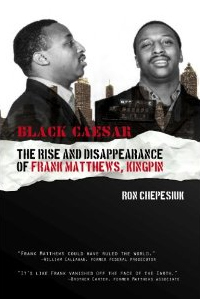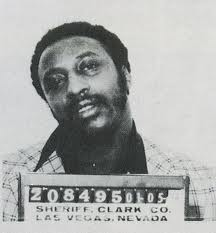Special to Americanmafia.com
 |
Black Caesar: The Rise and Disappearance of America's Biggest Kingpin
by Ron Chepesiuk
|
This is an excerpt from Ron Chepesiuk's new book about the Frank Matthews story: Black Caesar: The Rise and Disappearance of America's Biggest Kingpin. It is published by Strategic Media books (
www.strategicmediabooks.com). The web site is
www.frankmatthewsbook.com.
Who was Frank Matthews?
Born in 1944 in Durham, North Carolina, Matthews left his hometown when he was a teenager, going first to Philadelphia and then to New York City. By the early 1970's, Frank Matthews had become America's biggest drug kingpin. His organization, headquartered in Brooklyn, stretched across 21 states, and he became the only Black gangster to establish direct ties to the French Connection heroin pipeline. To quote William Callahan, a federal prosecutor assigned to the Matthews' case, "Matthews was a pioneering giant of drug distribution.
The $15 to 20 million Matthews is believed to have disappeared with is roughly equivalent to the $90 to $100 in today's cash. The book explores various theories about the fate of Frank Matthews, and the author offers his own conclusion about the mystery.
* * *
EXCERPT
Investigators continued to close in on Matthews. In November 1972,
BNDD agents had already arrested George Ramos, Miguel Garcia's godson
and partner in crime who had provided Matthews with seemingly
endless supplies of cocaine. "It was quite unusual for a black guy to come
down to Miami and buy coke from the Cubans," recalled Jack Lloyd, a
retired DEA agent who investigated George Ramos and the Matthews-
Miami drug connection. "Matthews would come down to Miami with
$100,000 or more and buy narcotics." When Ramos was arrested, Lloyd
personally brought him to New York for interrogation.
Ramos was personable, smart, good-looking and younger than Matthews.
He quickly sized up his options and knew what he had to do.
"When they brought Ramos to New York for questioning, he flipped right
away," Garay revealed. "We interrogated him for several days about Matthews
and his organization. He told us about how Matthews had worked
to establish the Venezuelan connection. We knew Ramos would be an important
witness against Matthews when we were ready to indict him."
 On November 22, Ramos appeared before the grand jury and testified
against Matthews. Ramos testified about various major deliveries of
narcotics involving Frank Matthews and his organization between April
and September 1972. Ramos recalled one meeting in June 1972 when
Matthews fronted $100,000 to Ramos and Garcia for a future shipment
of 100 kilos of heroin.
On November 22, Ramos appeared before the grand jury and testified
against Matthews. Ramos testified about various major deliveries of
narcotics involving Frank Matthews and his organization between April
and September 1972. Ramos recalled one meeting in June 1972 when
Matthews fronted $100,000 to Ramos and Garcia for a future shipment
of 100 kilos of heroin.
Marshals guarded Ramos around the clock while they made arrangements
for his entry into the Federal Witness Protection Program. Once
that was done, the Marshals moved Ramos to Portland, Oregon, for safekeeping
while they finished their takedown of Black Caesar.
After a year of investigation, the authorities were ready to put the cuffs
on Black Caesar. On December 20, 1972, prosecutors obtained a warrant
for Matthews' arrest, but it was the holiday season, and authorities felt
no urgency to execute the warrant. Matthews was able to spend a quiet
Christmas with his family. Then, on New Year's Eve 1972, investigators
got wind that Matthews, his girlfriend Cheryl Denise Brown, and several
suitcases had left town for Las Vegas. He spent about a week in Las
Vegas before traveling to Los Angeles and the Super Bowl game between
the Miami Dolphins and Washington Redskins. Group 12 alerted the
Las Vegas BNDD office and gave instructions to keep Matthews under
surveillance, and agents tailed Black Caesar, but he still liked to have
fun with his pursuers. Agents lost him several times in traffic. Worried
that Matthews might be planning to disappear, Group 12 ordered the
BNDD's Las Vegas office to arrest him.
At 11 a.m., January 5, 1973, Matthews and Brown were picked up at
Las Vegas' McCarran International Airport as they were about to board a
plane for Los Angeles. Matthews offered no resistance. One hour later, he
was arraigned in court before U.S. Magistrate Joe Ward. He had $5,000
on him and tried to give it to Brown so she could have money to get back
home. The Marshals took Brown into custody, even though there was no
warrant for her arrest. They searched through Brown's purse and found
a motel key. They charged her with possession of burglary tools. The authorities
told the press that the charge was a technical complaint pending
further investigation.
 The federal warrant charged Matthews with possession and intent to
sell 18.6 kilos (almost 41 pounds) of cocaine between April and September
of 1972. The street value of the cocaine was estimated to be worth
between $1 million and $4.5 million. The federal warrant named George
Ramos as the man who told federal investigators that he and Matthews
had flown to Miami and delivered large sums of money to Miguel Garcia
in return for cocaine.
The federal warrant charged Matthews with possession and intent to
sell 18.6 kilos (almost 41 pounds) of cocaine between April and September
of 1972. The street value of the cocaine was estimated to be worth
between $1 million and $4.5 million. The federal warrant named George
Ramos as the man who told federal investigators that he and Matthews
had flown to Miami and delivered large sums of money to Miguel Garcia
in return for cocaine.
Excited by the news of Matthews' arrest, Bill Callahan and Gerard
Miller caught the first plane to Las Vegas. The next day they were in the
courtroom for a bail bond hearing for Matthews before magistrate Joseph
L. Ward. Black Caesar was as cocky as ever. "We were literally face
to face," Callahan recalled. "He told us that we had nothing on him and
that he would be out in no time."
Prosecutors argued before the magistrate that a high bail was necessary
to insure Matthews remained in jail until he could be extradited to
New York. They contended that Black Caesar was a threat to flee and
had the money to do it. To make their point, they explained that as a big
gambler, he had lost up to $120,000 in the casinos. They claimed he had
millions of dollars stashed away in safety deposit boxes in Las Vegas.
None of the authorities, however, expected Ward's decision. He set bail
at $5 million, the highest bail in U.S. history. As Matthews left the Las
Vegas courtroom, stunned and handcuffed to a federal marshal, a small,
bald, bespectacled nondescript looking man walked up to him and identified
himself as an IRS agent. He pulled out a piece of paper from his
briefcase and handed it to Matthews.
"What's this?" Matthews asked.
"It's a termination assessment," the IRS agent replied, explaining in
precise detail, "Your taxable income for the year just ending December
31, 1971, was approximately $100 million. You owe $7,007,165 in taxes,
plus a $6 lien fee." The IRS's tax estimate was based on evidence of alleged
criminal activities and was used in cases where the IRS feared that
collecting the money might be a problem.
An incredulous Mathews looked at the IRS agent and said, "How the
fuck am I supposed to pay that?"
The IRS agent did not miss a beat, "Preferably in cash."
The assessment put Matthews in a bind. To get his client's bail reduced
Stanley Kaufman, Matthews' lawyer who had flown in to Las Vegas from
New York, had told Magistrate Ward that his declared income for 1971
was just $200,000. Matthews, however, would have to pay the $2.5 million
bond plus the $7,009,165 that he owed to the IRS if he hoped to make
bail. But he faced tax evasion charges if he paid that amount. After all, how
does a man with a declared income of $200,000 get that kind of money?
The enormous size of the bail caught the press's attention, and overnight
Matthews went from being an unknown drug dealer to a media
curiosity, especially when authorities began describing Matthews as the
"biggest narcotics man" in New York City. New York newspaper article
headlines described Black Caesar as "the mystery man of Todt Hill" and
revealed how life had been "high style for (the) dope suspect."
A Matthews neighbor told the New York Daily News, "Matthews is a
curiosity in the neighborhood because he's the only black here. He's lived
here a year or two. It's no surprise to hear about his arrest. When I told
some people recently that I lived on Buttonwood Road, they said, 'Oh,
you're right near the Harlem dope king.'"
Another neighbor described Matthews as being protective of his privacy,
although he appeared to be a lavish spender. "I've never seen him
except when he drove by in one of his cars. He has about $10,000 worth
of cars, including a Rolls Royce parked in his driveway. It's common
knowledge he was taken to the cleaners on his home, charged exorbitant
prices by the contractors."
Eventually, Keith Diamond, the Matthews tutor, read press reports
about how the police had put Matthews' house under surveillance. At
first the reports brought a chill to his spine. Then he smiled. Diamond
remembered how he would show up at Matthews' Todt Hill mansion
carrying a briefcase and looking like a Matthews associate. The authorities
never brought him in for questioning.
"It was all over the news�the arrest in Las Vegas of the big New York
drug dealer," he recalled. "Then I started to get phone calls about the arrest
from my parents in Florida, from my friends� Did you hear? Did
you hear? It was him, Frank Matthews. Eventually, I was disappointed
because I needed the job."
With bail set, the authorities were ready to transport Matthews back
to New York City.

